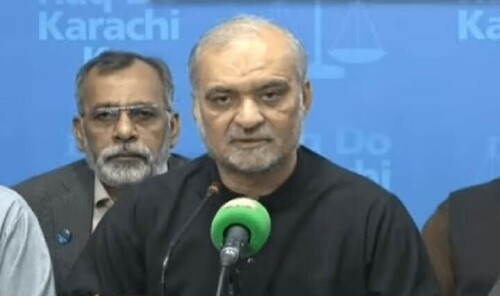Adviser to the Prime Minister on Foreign Affairs Sartaj Aziz on Saturday evening left for Amritsar to attend the Heart of Asia ministerial conference.
Upon his arrival, he was received by Pakistan High Commissioner to India Abdul Basit and the joint secretary of Indian Ministry of External Affairs.
Sartaj Aziz also sent a bouquet to Indian External Affairs Minister Sushma Swaraj at her residence, extending his sincere good wishes for her full and speedy recovery.
The Heart of Asia ministerial conference began in Amritsar today amid heightened tensions between Pakistan and India, triggering speculation as to whether the two countries will engage in bilateral talks on the sidelines of the event.
Aziz is leading the Pakistani delegation to the meeting of the process that focuses on regional cooperation between Afghanistan and its neighbours to improve connectivity and tackle security threats.
The opening Senior Officials Meeting on Saturday will discuss and finalise the text for the 6th Ministerial Conference of the Heart of Asia-Istanbul Process. Today's meeting will also cover all the necessary technical aspects of the declaration for the 6th Ministerial Conference.
The 6th Ministerial Conference will be held on Sunday.
Pakistan, Afghanistan, Azerbaijan, China, India, Iran, Kazakhstan, Kyrgyzstan, Russia, Saudi Arabia, Tajikistan, Turkey, Turkmenistan and the United Arab Emirates are part of the Heart of Asia initiative launched in 2011 for encouraging economic and security cooperation between Afghanistan and its neighbours for dealing with the common problems of terrorism, extremism and poverty.
Six key areas in which the 14 countries have been pursuing confidence-building measures since the 2013 Almaty meeting are disaster management, counter-terrorism, counter-narcotics, trade and investment, regional infrastructure, and education.
The process is supported by 17 other, predominantly Western, countries, and 12 international organisations which are also sending senior representatives.
Pakistan's participation, possibility of talks with India
The Pakistani government took a bold decision of attending the Heart of Asia conference this year despite a deep freeze in ties with India. Pakistan's decision came even though New Delhi had scuttled the Saarc summit that Islamabad was to host in November 2016.
Speculations abound whether India and Pakistan will use the avenue to engage in bilateral talks but spokesman for Indian Minister of External Affairs, Vikas Swarup, ruled out the possibility in a press briefing on Friday.
"Talks cannot happen in a climate of continued terrorism. India will never accept continued terrorism as the new normal of the bilateral relationship," Swarup said during the briefing.
Meanwhile in an interview, Pakistan High Commissioner to New Delhi Abdul Basit said Pakistan remained open to the idea of holding talks with India on the sidelines of the Heart of Asia conference but added that attention must remain on Afghanistan.
"Whether or not there are bilateral talks, our adviser is coming because Afghanistan is important for us, its stability and economy are important for us so we will participate constructively," Basit said.












































